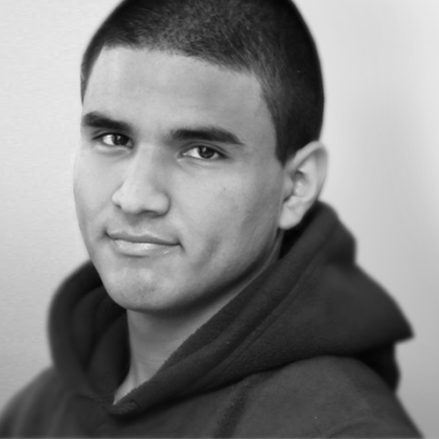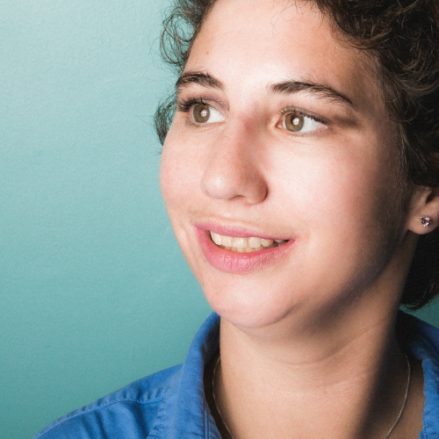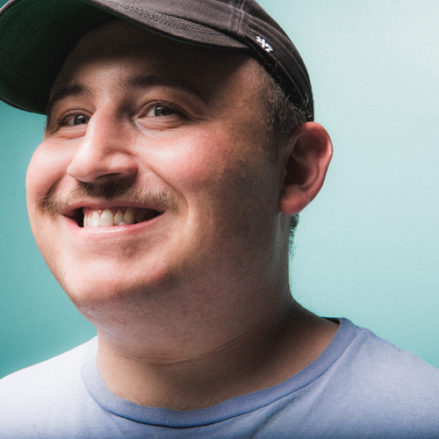At Center for Independent Futures, our Life Skills Tutors commit to providing person-centered planning and life skills development. From day one, we have understood the power of asking an individual, “What are your hopes and dreams?” We are proud to have been one of the first agencies in Illinois to put the individual at the heart of our services. As more agencies ask themselves how to implement person-centered services, we want to share our experiences with you.
What is Person-Centered Planning?
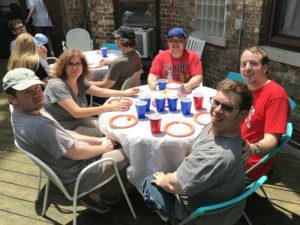 Historically, people with disabilities were institutionalized and excluded from society. However, over time American society has come to realize that institutions are not the answer. Moving away from institutions, states have largely chosen their own standards of care and have created new policies at varying rates.
Historically, people with disabilities were institutionalized and excluded from society. However, over time American society has come to realize that institutions are not the answer. Moving away from institutions, states have largely chosen their own standards of care and have created new policies at varying rates.
Person-centered planning is one of these policies that states are implementing at different speeds. At the core of this policy lies an individual’s vision for their own future. The goal of person-centered planning is to support an individual with disabilities in creating the future of their dreams. A tutor or team then decides on necessary supports based on individual goals.
These personalized support plans are never cookie-cutter designs. They are based on individual dreams, and then enacted using individualized support options. Because person-centered care is radically different from traditional supports for people with disability, sometimes agencies struggle with this change and wonder: how can we implement these ideas?
How Does Person-Centered Work?
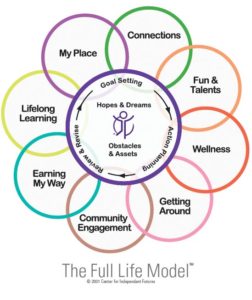 In our office, we think of person-centered care as continued evaluation of a person’s hopes and dreams – and the action steps necessary to achieve their goals. With our participants, we begin by meeting with the individual’s support group, made up of family, friends, and community members.
In our office, we think of person-centered care as continued evaluation of a person’s hopes and dreams – and the action steps necessary to achieve their goals. With our participants, we begin by meeting with the individual’s support group, made up of family, friends, and community members.
We begin by asking about hopes and dreams, and then we identify obstacles and assets. This information helps to define goals and create action plans. Throughout this process, we listen, look, and learn to understand how we can best help someone create and reach goals.
Supplemented by our skills inventory and curriculum, individuals work with tutors to identify what life skills can help attain goals. Each part of person-centered care requires reflection and revision from time to time. As skills develop or dreams change, these plans have to be flexible enough to allow for new ideas.
Want to Learn More?
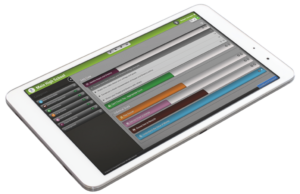
In the last 5 years, Illinois mandated that by 2022 all agencies must use person-centered planning to work with their participants and clients. For agencies and educators, we offer our My Full Life™ online application. My Full Life includes an in-depth skills inventory, plus the most comprehensive skills curriculum available.
If you are interested in learning more, please visit our Schools & Agencies page and request more information through our My Full Life form. We can’t wait to help you on the journey to providing person-centered care.

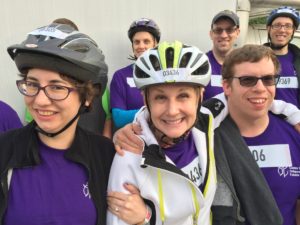 When you ride with Center for Independent Futures’ Dream Team, you’ll be part of a team of individuals with and without disabilities, including participants, staff, board members, and friends. Our team members participate in this incredible event and raise funds for our programs and services in honor of their ride. Center for Independent Futures makes it easy to participate by supporting riders to sign up for the event, helping with fundraising, and taking care of transportation logistics on the day of the event.
When you ride with Center for Independent Futures’ Dream Team, you’ll be part of a team of individuals with and without disabilities, including participants, staff, board members, and friends. Our team members participate in this incredible event and raise funds for our programs and services in honor of their ride. Center for Independent Futures makes it easy to participate by supporting riders to sign up for the event, helping with fundraising, and taking care of transportation logistics on the day of the event.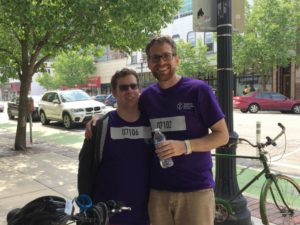 We
We  For the first time, we will be offering Golden Tickets to our community! Golden Tickets are a new way to participate in our favorite night of the year. There will only be 150 Golden Tickets sold, so you know what your chances of winning are! If you purchase a Golden Ticket, please make sure that you have selected your prize at the time of purchase. Winners need not be present to win. Each Golden Ticket is $100, and the prize is something special!
For the first time, we will be offering Golden Tickets to our community! Golden Tickets are a new way to participate in our favorite night of the year. There will only be 150 Golden Tickets sold, so you know what your chances of winning are! If you purchase a Golden Ticket, please make sure that you have selected your prize at the time of purchase. Winners need not be present to win. Each Golden Ticket is $100, and the prize is something special!  Enjoy a weeklong vacation at Villa Vista Magnifica in Costa Rica, overlooking the Pacific Ocean and gorgeous beaches Playa Prieta and Playa Penca. Villa Vista Magnifica is a 5 bedroom, 5.5 bath villa staffed with 2 full-time employees. You and 9 of your friends can relax in luxury with such features as an outdoor shower, a private patio, an infinity edge pool, and an upstairs terrace view. Airfare not included; average airfare to Costa Rica is $450 per person. High season is from May through July.
Enjoy a weeklong vacation at Villa Vista Magnifica in Costa Rica, overlooking the Pacific Ocean and gorgeous beaches Playa Prieta and Playa Penca. Villa Vista Magnifica is a 5 bedroom, 5.5 bath villa staffed with 2 full-time employees. You and 9 of your friends can relax in luxury with such features as an outdoor shower, a private patio, an infinity edge pool, and an upstairs terrace view. Airfare not included; average airfare to Costa Rica is $450 per person. High season is from May through July. Four seats to your choice of two 2019 games decided upon in conjunction with the donor. These seats offer an extraordinary opportunity to experience Wrigleyville’s favorite team from premium seats only 10 rows behind home plate.
Four seats to your choice of two 2019 games decided upon in conjunction with the donor. These seats offer an extraordinary opportunity to experience Wrigleyville’s favorite team from premium seats only 10 rows behind home plate.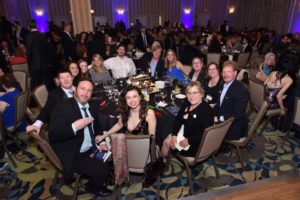 Tickets are on sale
Tickets are on sale  Self-determination skills are developed through a combination of skills, knowledge, and beliefs. Those pieces of self-determination help people engage in goal-directed, self-regulated, autonomous activity. Learning how to act in a self-directed manner empowers every student who gains these skills.
Self-determination skills are developed through a combination of skills, knowledge, and beliefs. Those pieces of self-determination help people engage in goal-directed, self-regulated, autonomous activity. Learning how to act in a self-directed manner empowers every student who gains these skills. Invest time in facilitating student-driven IEPs and transition planning, and check in with students to make sure they are prepared for meetings. All students are capable of being involved in planning their life.
Invest time in facilitating student-driven IEPs and transition planning, and check in with students to make sure they are prepared for meetings. All students are capable of being involved in planning their life.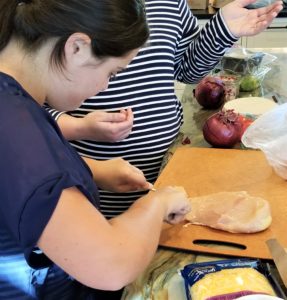 For the past twelve years, Cynthia Witherspoon has been working with the Full Life Model, developing tools and resources. She is an expert in our online application for life skills development,
For the past twelve years, Cynthia Witherspoon has been working with the Full Life Model, developing tools and resources. She is an expert in our online application for life skills development, 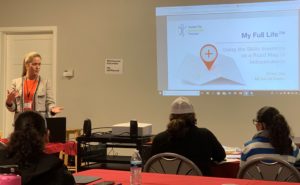 My Full Life Director Chrissy Dale also escaped to California during Chicagoland’s intense cold. Chrissy presented at the Tools For the Journey conference, hosted by Club 21. Using our Skills Inventory as a Road Map to Independence, Chrissy demonstrated how families can support the growth and development of their child.
My Full Life Director Chrissy Dale also escaped to California during Chicagoland’s intense cold. Chrissy presented at the Tools For the Journey conference, hosted by Club 21. Using our Skills Inventory as a Road Map to Independence, Chrissy demonstrated how families can support the growth and development of their child.  Learning self-advocacy means developing a set of skills that are based on self-knowledge, communicating your understanding, and knowing your rights. When educators teach self-advocacy skills to students with disabilities, that knowledge opens doors to success that might otherwise never have appeared.
Learning self-advocacy means developing a set of skills that are based on self-knowledge, communicating your understanding, and knowing your rights. When educators teach self-advocacy skills to students with disabilities, that knowledge opens doors to success that might otherwise never have appeared. 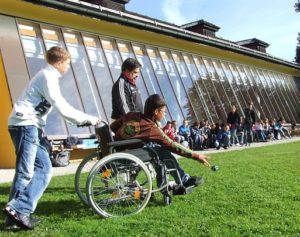 Begin by understanding the students’ strengths and weaknesses. Teachers can conduct a skills assessment, and then they should try to focus on the strengths. Starting with strengths helps students refrain from internalizing low expectations. With a solid understanding of their talents, students will leave class with greater self-awareness.
Begin by understanding the students’ strengths and weaknesses. Teachers can conduct a skills assessment, and then they should try to focus on the strengths. Starting with strengths helps students refrain from internalizing low expectations. With a solid understanding of their talents, students will leave class with greater self-awareness. Teachers who want to support students in upholding their rights should try to create learning activities that engage all of their students on this topic. Some schools are beginning to move toward
Teachers who want to support students in upholding their rights should try to create learning activities that engage all of their students on this topic. Some schools are beginning to move toward 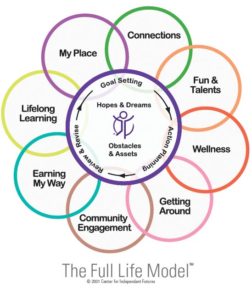 Teaching current students how to advocate for themselves is obviously crucial to their post-school success. But what about adults with disabilities who weren’t taught self-advocacy skills in school? My Full Life™ can help. An online learning management system,
Teaching current students how to advocate for themselves is obviously crucial to their post-school success. But what about adults with disabilities who weren’t taught self-advocacy skills in school? My Full Life™ can help. An online learning management system, On Tuesday, November 27th, countries around the world celebrated #GivingTuesday. In Illinois, we also participate in #ILGive, an
On Tuesday, November 27th, countries around the world celebrated #GivingTuesday. In Illinois, we also participate in #ILGive, an  As if raising more than $24,000 in one day wasn’t exciting enough, we were also offered a matching grant opportunity. For every donation of $175 or more, we received an additional $175 thanks to the Coleman Foundation. As a result, Center for Independent Futures will receive an additional $10,000!
As if raising more than $24,000 in one day wasn’t exciting enough, we were also offered a matching grant opportunity. For every donation of $175 or more, we received an additional $175 thanks to the Coleman Foundation. As a result, Center for Independent Futures will receive an additional $10,000!  The day after we hiked to Glendalough, we took a stroll of the Temple Bar district in Dublin, Ireland. We also took a tour of the Wall of Fame where famous Irish musicians held their place in the Irish music industry such as U2, Thin Lizzy, Enya, Sinead O’Connor, The Corrs, and Celtic Woman. We also ate dinner in an Irish restaurant and we listened to traditional Irish music. One of my favorite Irish foods that I ate in Ireland was the traditional Irish breakfast which consisted of an egg, blood sausages, 2 pork sausage links, mushrooms, ham, bacon, and roasted tomato. Another favorite food that I tried in Ireland was the fish and chips, which is beer battered cod fish with chips – or as the Americans call them, French fries.
The day after we hiked to Glendalough, we took a stroll of the Temple Bar district in Dublin, Ireland. We also took a tour of the Wall of Fame where famous Irish musicians held their place in the Irish music industry such as U2, Thin Lizzy, Enya, Sinead O’Connor, The Corrs, and Celtic Woman. We also ate dinner in an Irish restaurant and we listened to traditional Irish music. One of my favorite Irish foods that I ate in Ireland was the traditional Irish breakfast which consisted of an egg, blood sausages, 2 pork sausage links, mushrooms, ham, bacon, and roasted tomato. Another favorite food that I tried in Ireland was the fish and chips, which is beer battered cod fish with chips – or as the Americans call them, French fries.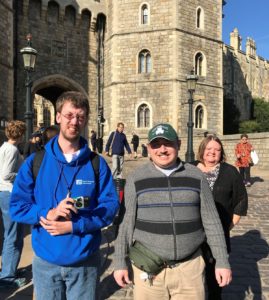

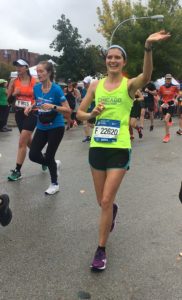 On October 13, 2019, thousands of dedicated runners will line up at Grant Park, ready to take on the
On October 13, 2019, thousands of dedicated runners will line up at Grant Park, ready to take on the 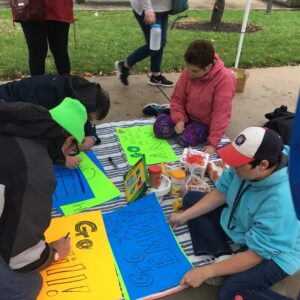 Of course! There is room for spectators along the whole course, but Mile 15 is really where the party’s at. At Mile 15, there is the Charity Block Party, where cheerleaders from charity partners like Center for Independent Futures will be waiting to cheer on our team — and all the other runners, of course! Your friends and family are always welcome to join us at the block party!
Of course! There is room for spectators along the whole course, but Mile 15 is really where the party’s at. At Mile 15, there is the Charity Block Party, where cheerleaders from charity partners like Center for Independent Futures will be waiting to cheer on our team — and all the other runners, of course! Your friends and family are always welcome to join us at the block party!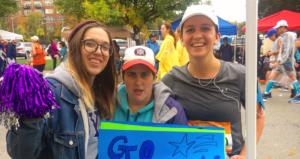 It’s easy! Just email team coordinator
It’s easy! Just email team coordinator 

